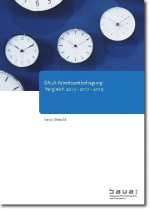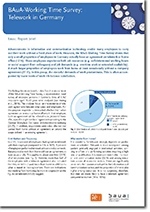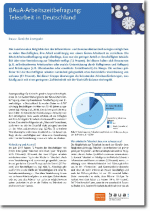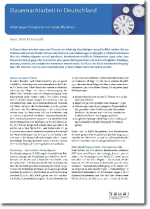- Project number: F 2452
- Institution: Federal Institute for Occupational Safety and Health (BAuA)
- Status: Completed Project
Description:
The project is part of the "Working Time Reporting for Germany" initiative of the Federal Institute for Occupational Safety and Health. The core of the initiative is the implementation of the BAuA-Working Time Survey as a panel survey. The aim of the initiative is to communicate and to publish findings on working time and working time-related aspects in Germany based on the data of the BAuA-Working Time Survey for various target groups (science, politics, social partners, professional public, etc.).
As part of the project "Working time reporting for Germany: Implementation, scientific preparation and utilisation of the BAuA-Working Time Survey 2019", the third wave of the survey, which was designed as a panel survey, was conducted in 2019. About 7400 employees who had already participated in an earlier wave of the survey in 2015 and/or 2017 were re-surveyed. In addition, more than 3,000 previously unsurveyed employees were interviewed. All respondents are employees in Germany who work at least 10 hours a week. In a computer-assisted telephone interview, the respondents provided information on their employment situation, aspects of working time, other working conditions as well as health and well-being.
In the project, data of all three waves (years 2015, 2017 and 2019) of the BAuA-Working Time Survey were analysed and used for publications and presentations. The results were examined with regard to the three main research areas of "socio-structural characteristics and working time arrangements", "working time and health" and "work-life balance and dissolution of boundaries".
Socio-structural characteristics and working time arrangements
The analyses of the BAuA working time survey provide an overview of how working time is organised in different groups of employees. The report "BAuA-Working Time Survey: Comparison 2015 - 2017 - 2019" shows how the length, location and flexibility of working time developed in different employee groups until before the onset of the Covid-19 pandemic. Among other things, it shows that many working time conditions hardly changed in the period from 2015 to 2019. However, more and more full-time employees want to work less hours and there is an increase in working time autonomy as well as teleworking or other forms of working from home. The report also provides an insight into the rather unfavourable working time patterns of employees in care-related occupations. In the report "BAuA-Working Time Survey: Commuting, teleworking, business trips, changing and mobile places of work", various forms of work-related spatial mobility are addressed. The analyses provide an overview of which forms of mobility are common among which groups of employees. Among other things, it is shown that certain characteristics (men, living with partner, full-time employment, high qualification / intellectual activities, office job, large companies) are more frequently associated with work-related mobility.
Working time and health
With regard to the role of working time organisation for the health of employees, the analyses show, as expected, that higher working time requirements in terms of duration (e.g. overtime, excessive working hours), location (e.g., shift work, Sunday work) and flexibility (e.g. shortened rest periods, constant availability) are often associated with reduced work-life balance, recovery and health, while working time autonomy seems to act as a resource that is associated with positive stress consequences. Among other things, the analyses in the project show that the constellations of working time conditions are of importance in this context. For example, working time constellations characterised by reduced working time autonomy and higher working time requirements such as shift work and overtime tend to be associated with poorer health. Expectations to be available for work-related matters outside regular working hours is also more likely to be associated with negative stress consequences - especially if availability expectations are seen as illegitimate, i.e. unnecessary or unreasonable. Furthermore, the analyses show that in the various forms of work-related mobility, it is above all the accompanying constellations of stressors (e.g. time limitation) and resources (e.g. working time autonomy) that are decisive for the stress consequences.
Work-life balance and dissolution of boundaries
The project results show that for employees‘ satisfaction with their work-life balance it is not as important that the working time conditions correspond exactly to their preferences but that the actual working hours do not exceed the preferred number working hours, that employees have a certain extent of working time autonomy, and that the boundaries between work and private life do not become blurred. Preferences regarding the segmentation of work and private life play only a minor role with regard to satisfaction with work-life balance compared to working time flexibility requirements and possibilities. The fit between actual and desired working hours is also relevant for the desired retirement timing. Furthermore, analyses in the project show that high mobility requirements (long-distance commuting, unregulated working from home, work at changing or mobile work locations, overnight stays away from home) are associated with higher dissatisfaction with the work-life balance. In many cases, this is due to an increased dissolution of temporal boundaries.






